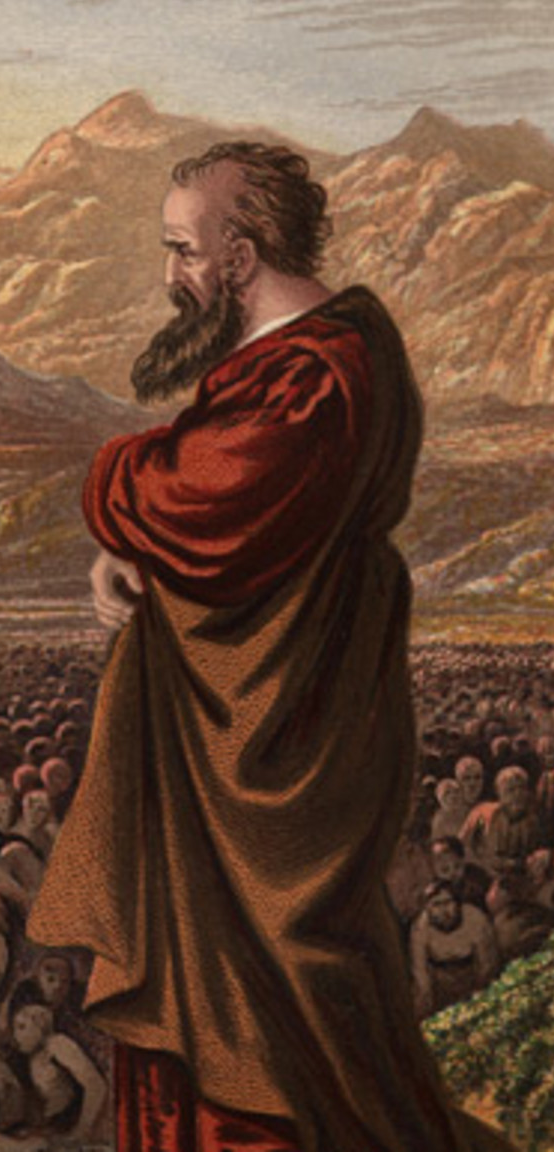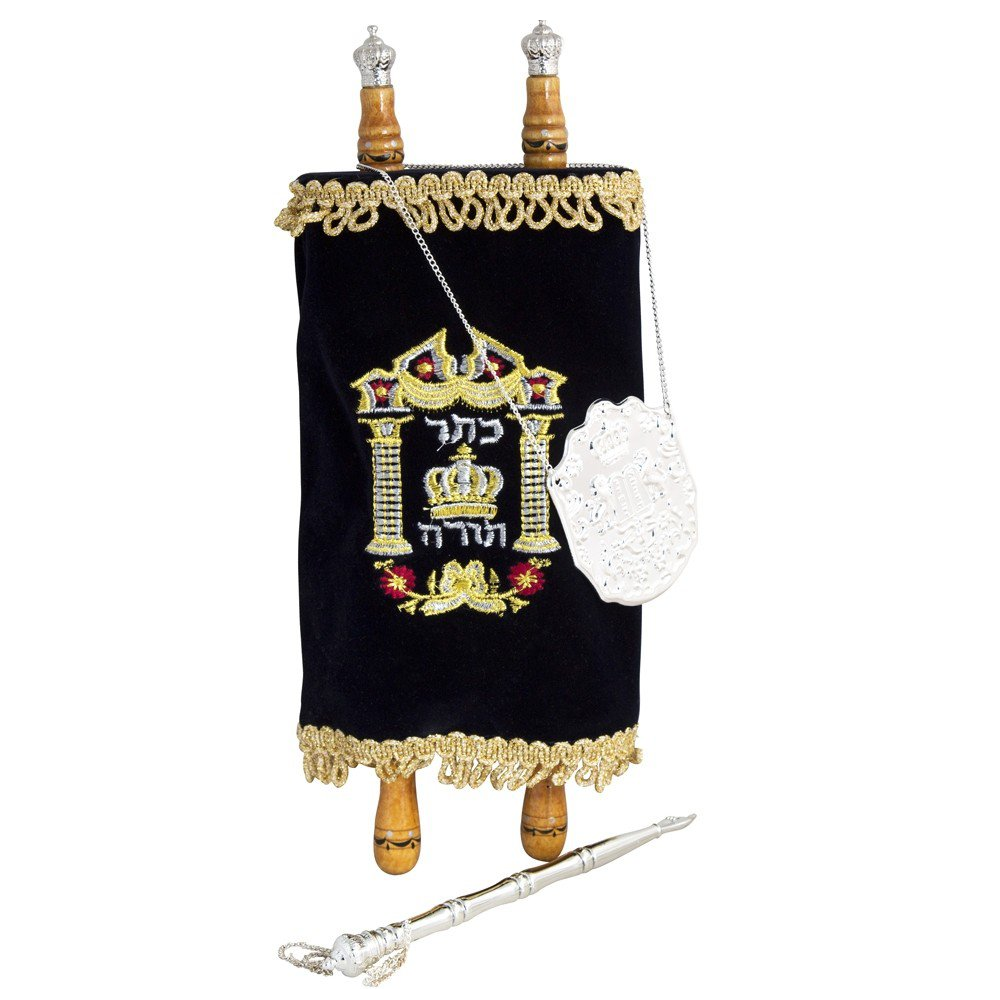|
Weekly Parashah |
|||||
| Torah: Lev. 16:1-18:30
|
Haftara: 1 Sam. 20:18-42 | Brith Chadashah: John 7 : 1 - 52 | |||
| Acharei Mot (After the Death) |
|||||
Scripture: |
Leviticus 16 : 1 – 18 : 30 |
Torah |
|||
|
|
Parashat Acharei Mot16 Then Adonai spoke to Moses after the death of the two sons of Aaron, when they approached the presence of Adonai and died. 2 Adonai said to Moses, “Tell Aaron your brother not to come at just any time into the Holiest Place behind the curtain[a]—before the atonement cover which is on the Ark—so that he would not die. For I will be appearing in the cloud over the atonement cover.[b] Yom Kippur Service3 “In this way should Aaron come into the Sanctuary: with a young bull for a sin offering and a ram for a burnt offering. 4 He is to put on the holy linen garment, have the linen undergarments on his body, put on the linen sash, and wear the linen turban—they are the holy garments. He should bathe his body in water, and put them on. 5 “Then he is to take from the congregation of Bnei-Yisrael two he-goats for a sin offering and one ram for a burnt offering. 6 Then Aaron is to offer the bull for the sin offering which is for himself and make atonement for himself and his house. 7 Then he is take the two goats and present them before Adonai at the entrance of the Tent of Meeting. 8 Aaron will then cast lots for the two goats—one lot for Adonai, and the other lot for the scapegoat. 9 Aaron is to present the goat on which the lot for Adonai fell and make it a sin offering. 10 But the goat upon which the lot for the scapegoat[c] fell is to be presented alive before Adonai, to make atonement upon it,[d] by sending it away as the scapegoat into the wilderness. https://www.biblegateway.com/passage/?search=Leviticus+16%3A1-18%3A30&version=TLV
|
||||
Scripture: |
1 Samuel 11 : 14 – 12 : 22 |
Haftarah |
|||
|
18 Then Jonathan said to him, “Tomorrow is the New Moon. You’ll be missed because your seat will be empty. 19 On the third day, you must go down quickly and come to the place where you hid as you did on that day, and remain close to the stone Ezel. 20 I will shoot three arrows to the side of it, as though I were shooting at a target. 21 Now look, I will send a lad saying, ‘Go, find the arrows.’ If I specifically say to the lad, ‘See, the arrows are on this side of you—get them,’ then come; for it is safe for you and no danger, as Adonai lives. 22 But if I say to the boy: ‘Look, the arrows are beyond you,’ then go your way, for Adonai has released you. 23 But as for the matter which I and you have spoken about, behold, Adonai is between me and you forever.” 24 So David hid himself in the field, and when the New Moon came, the king sat down to eat a meal. 25 So the king sat on his seat—as usual, the seat by the wall—Jonathan stood up and Abner sat down by Saul’s side, but David’s place was empty. 26 Nevertheless, Saul said nothing that day, for he thought, “It must be an accident; he must be ceremonially unclean—yes, that’s it, he’s unclean.” 27 Yet it came to pass on the day following the New Moon, the second day, that David’s place was still empty. So Saul asked his son Jonathan, “Why didn’t Jesse’s son come to the meal yesterday or today?” 28 Jonathan answered Saul, “David earnestly asked leave of me to go to Beth-lehem, 29 as he said, ‘Please let me go, for we are going to have a family feast in the town, and my brother has commanded me. So now, if I have found favor in your eyes, let me go, please, to see my brothers. That’s why he hasn’t come to the king’s table.” https://www.biblegateway.com/passage/?search=1+Sam.+20%3A18%E2%80%9342&version=TLV
|
 |
||||
Scripture: |
John 7 : 1 – 52 |
Brit Chadashah |
|||
|
|
Anticipating Hostility at Sukkot7 After these events, Yeshua was walking about in the Galilee. He did not want to walk in Judea, because the Judean leaders wanted to kill Him. 2 Now the Jewish Feast of Tabernacles[a] was near. 3 Therefore His brothers said to Him, “Leave here and go to Judea, so Your disciples also may see the works You are doing. 4 No one who wants to be well known does everything in secret. If You are doing these things, show Yourself to the world!” 5 For not even His brothers were trusting in Him. 6 Therefore Yeshua said to them, “My time has not yet come, but your time is always at hand. 7 The world cannot hate you, but it hates Me because I testify that its works are evil. 8 You go on up to the Feast. I’m not going to this feast, because My time hasn’t yet fully come.” 9 After saying these things, He stayed in the Galilee. 10 But after His brothers went to the Feast, He also went, not openly but secretly. 11 Then the Judean leaders were searching for Him at the Feast and kept asking, “Where is that fellow?” https://www.biblegateway.com/passage/?search=Jn.+7%3A1%E2%80%9352&version=TLV |
||||
Parashah in 60 seconds |
|||||
Music Styles Southern Gospel
Styles
On this radio station you will find the following music styles;Southern Gospel
Southern gospel music is a genre of Christian music. Its name comes from its origins in the Southeastern United States whose lyrics are written to express either personal or a communal faith regarding biblical teachings and Christian life, as well as (in terms of the varying music styles) to give a Christian alternative to mainstream secular music. Sometimes known as "quartet music" for its traditional "four men and a piano" set up, southern gospel has evolved over the years into a popular form of music across the United States and overseas, especially among baby boomers and those living in the Southern United States. Like other forms of music the creation, performance, significance, and even the definition of southern gospel varies according to culture and social context. It is composed and performed for many purposes, ranging from aesthetic pleasure, religious or ceremonial purposes, or as an entertainment product for the marketplace.Origins
The date of southern gospel's establishment as a distinct genre is generally considered to be 1910, the year the first professional quartet was formed for the purpose of selling songbooks for the James D. Vaughan Music Publishing Company in Lawrenceburg, Tennessee. Nonetheless the style of the music itself had existed for at least 35 years prior although the traditional wisdom that southern gospel music was "invented" in the 1870s by circuit preacher Everett Beverly is spurious. The existence of the genre prior to 1910 is evident in the work of Charles Davis Tillman (1861–1943), who popularized "The Old Time Religion", wrote "Life's Railway to Heaven" and published 22 songbooks.[1][2][3] Some of the genre's roots can be found in the publishing work and "normal schools" of Aldine S. Kieffer and Ephraim Ruebush. Southern gospel was promoted by traveling singing school teachers, quartets, and shape note music publishing companies such as the A. J. Showalter Company (1879) and the Stamps-Baxter Music and Printing Company. Over time, southern gospel came to be an eclectic musical form with groups singing traditional hymns, a capella (jazz-style singing with no instruments) songs, country, bluegrass, spirituals, and "convention songs". Because it grew out of the musical traditions of white musicians from the American South, the name Southern gospel was used to differentiate it from so-called black gospel.[4][5]
Early performers
Southern gospel is sometimes called "quartet music" by fans because of the originally all-male, tenor-lead-baritone-bass quartet make-up. Early quartets were typically either a cappella or accompanied only by piano or guitar, and in some cases a piano and banjo in areas that were influenced by bluegrass music such as Appalachia. Over time, full bands were added and even later, pre-recorded accompaniments (soundtracks) were introduced.
In the first decades of the twentieth century, southern gospel drew much of its creative energy from the holiness movement churches that arose throughout the south. Early gospel artists such as The Speer Family, The Stamps Quartet, The Blackwood Family, and The Lefevre Trio achieved wide popularity through their recordings and radio performances in the 1920s, 1930s, 1940s and 1950s. On October 20, 1927, The Stamps Quartet recorded its early hit "Give The World A Smile" for RCA Victor, which become the Quartet's theme song. The Stamps Quartet was heard on the radio throughout Texas and the South. A handful of groups were considered pioneers in southern gospel music for a series of "firsts." The Blackwood Brothers, with James Blackwood and J.D. Sumner became the first group to travel in a Bus, which is on display at the Southern Gospel Music Hall of Fame at Dollywood in Pigeon Forge, Tennessee. Sumner also was instrumental in creating the National Quartet Convention, an annual music festival where many groups, both known and well known perform for a week. The Speer Family was known for bringing blended groups to mainstream popularity where both Male and Female performers toured together.
1960's
The best known group of the 1950s and 1960s was Statesmen Quartet, which set the trend for broad appeal of the all male quartets that would develop years later. The Statesmen were known for their showmanship and introduction of Jazz, ragtime, and even some early rock and roll elements into their music and their stage appearance with trendy suits and wide audience appeal and were known for their signature song, "Happy Rhythm" (Rockin and a'Rollin).
Representative artists
From the start of the genre, the predominant type of artist has been the male quartet. Notable examples from the past and present include, The Blackwood Brothers, Brian Free and Assurance, The Cathedral Quartet, Christian Troubadours, Ernie Haase & Signature Sound, The Florida Boys, The Gaither Vocal Band, Gold City, The Inspirations, Jake Hess and the Imperials, The Kingdom Heirs Quartet, The Kingsmen Quartet, Legacy Five, The Oak Ridge Boys, The Stamps Quartet, The Statesmen Quartet, and the Plainsmen Quartet.Notable artistsJ.D. Sumner and The Stamps toured with Elvis Presley, who originally wanted to be a Gospel singer despite trying out for numerous groups and never receiving an offer to join. Sumner and Presley met when Elvis was 14 years old and the two forged a strong relationship. Sumner sang at Presley's funeral and debunked many myths about Presley's alleged substance abuse and also credited Elvis for saving his life when Presley confronted Sumner about his alcoholism. Sumner held the world record for the lowest bass note ever hit for a human being until 2002, four years after his death.
The Cathedrals were perhaps the most successful quartet of the 1980s and 1990s. The group had massive appeal and recorded their 1987 album Symphony of Praise with the London Philharmonic Orchestra and also made numerous appearances NBC's The Today Show. After the deaths of frontmen George Younce and Glenn Payne, the Cathedrals spawned off two current groups that are immensely popular, The Legacy Five and Ernie Haase and Signature Sound.
Several secular artists have expressed their love for and influence of the genre by recording southern gospel albums or performing gospel songs in concert. Among them are Johnny Cash, Patsy Cline, Bob Dylan, Larry Gatlin, Alan Jackson, Kentucky Thunder, Jerry Lee Lewis, Loretta Lynn, Willie Nelson, The Oak Ridge Boys, Brad Paisley, Dolly Parton, Carl Perkins, Elvis Presley, Ricky Skaggs, The Statler Brothers, and Travis Tritt.
Today's southern gospel
By the 1990s, the "old-timey" quartet-style music began to develop to include more soloists and duos. Although still mostly popular in the Southeast and Southwest, it has a nationwide and even an international audience. The music remains "more country than city, more down-home than pretentious".[6]
Over the last decade, a newer version of southern gospel has grown in popularity. This style is called progressive southern gospel and is characterized by a blend of traditional southern gospel, bluegrass, modern country, contemporary Christian and pop music elements. Progressive southern gospel generally features artists who push their voices to produce a sound with an edge to it. The traditional style southern gospel singers employ a more classical singing style.Lyrically, most progressive southern gospel songs are patterned after traditional southern gospel in that they maintain a clear evangelistic and/or testimonial slant. Southern gospel purists view lyrical content and the underlying musical style as the key determining factors for applying the southern gospel label to a song.
Although there are some exceptions, most southern gospel songs would not be classified as Praise and Worship. Few southern gospel songs are sung "to" God as opposed to "about" God.




























